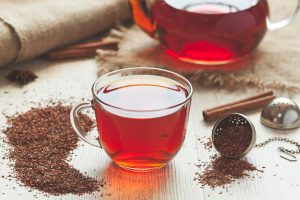Last month, China’s General Administration of Customs released its customs data for 2023. The data showed that China’s total trade with Africa grew a modest 1.5 percent in 2023, reaching $282.1 billion, but Africa’s trade deficit with China widened. While Chinese exports to Africa reached $173 billion, an increase of 7.5 percent over 2022, Africa’s exports to China dropped by 6.7 percent to $109 billion.
Given these figures, it came as welcome news that last month China reduced import tariffs for South African Rooibos tea from between 15 percent to 30 percent down to 6 percent. Despite being South Africa’s biggest trade partner and one of the world’s largest tea consumers, China’s high tariff rates for South African Rooibos tea have meant that China was just South Africa’s seventh-highest export destination in 2023, and prior to this, did not even make it to the top 10 for its famously healthy caffeine-free tea.
In comparison, China’s neighbor, Japan, despite applying a 17 percent tariff rate for Rooibos tea, has been South Africa’s top export destination for its Rooibos tea since 2020, because Japan has a large market for healthy tea. Japan is followed by European countries, such as France, Germany, and the Netherlands that offer zero tariffs for South African Rooibos teas as part of their Generalized Scheme of Preferences for developing countries.
Given the size of China’s consumer market, China’s decision to reduce tariffs for South African Rooibos tea by almost 80 percent could make China a priority export market in future. This could not only help reduce the trade deficit between South Africa and China, but also, if branded Rooibos products come into China, it could provide South Africa the opportunity to boost job creation and its value-added exports to China. South Africa’s Rooibos industry produces approximately 20,000 tons annually and employs 5,000 people.
That said, there is one major challenge to this aspiration: Recognition of South Africa’s Geographical Indications (GIs), including the GI for Rooibos tea.
GIs grant distinct rights to “the qualities, characteristics or reputation of the product essentially due to the place of origin,” according to the World Intellectual Property Organization. In other words, GI protection allows producers to raise retail prices. Well-known examples include French champagne and brie, English cheddar, and Italian prosciutto di parma ham, which are recognized in many countries and regions, including China.
Rooibos and other African products such as South African wine and Benin’s “sugarloaf” pineapples fall under the category of eligible Geographical Indications. On supermarket shelves, GI recognitions means these products must be original – others can’t manufacture versions of them, and the businesses that sell those products can ultimately get higher prices, meaning higher incomes in African countries.
China became Africa’s first partner to commit to developing a process to recognize Africa’s GIs at the eighth Forum on China-Africa Cooperation (FOCAC) in 2021, but no clear process has been revealed so far. With the ninth FOCAC due to take place in late 2024, and with the welcome push toward opening up China’s market to African products in recent years, African leaders need to ensure that a clear strategy to implement a process to recognize Africa’s GIs makes it to the FOCAC 9 agenda.
There are already several Chinese companies importing unprocessed Rooibos tea leaves into China and packaging them under their own brands. Pushing for the recognition of African GIs and exporting GI products, such as Rooibos tea, can help African countries to compete with other regions in the Chinese market and create space for distinct, higher-value African products to enter the Chinese market.
Fortunately, and with the recent tariff cut as an indication of goodwill and interest from China, South Africa is well positioned to lead the way in pushing for China to recognize African GIs. The South African Customs Union (SACU) has already secured the recognition of Rooibos tea’s GI status in the European Union in 2014 and the United Kingdom has also continued to recognize its GI post-Brexit. SACU can apply lessons learned from its negotiations with the EU and work with other African regional bodies, including the African Continental Free Trade Area Secretariat, to negotiate GI deals with China.
Indeed, a shared African strategy to see the FOCAC 8 pledge delivered, perhaps using Rooibos as a starting point, could make some difference to closing that trade deficit in 2024, so that both the volume and value of African exports to China consistently increases going forwards.

































